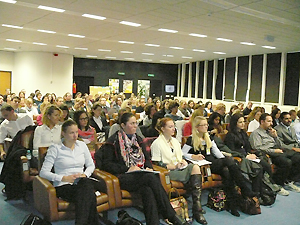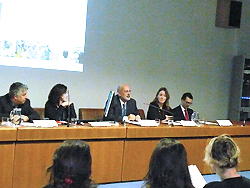

Over 120 students participated in the UN career event "Working for the United Nations" on 24 October 2011 at the Vienna International Centre (VIC).
The aim of that event was to point out the various career opportunities and career paths with the United Nations. Based on practical examples, a variety of job categories in the UN headquarters and different UN programmes as well as worldwide peacekeeping missions were presented. The event was organized by the United Nations Information Service in Vienna (UNIS) in cooperation with UNIPORT, the career service of the University of Vienna.
After the welcoming address by UNIS Vienna Acting Director Janos Tisovszky and UNIPORT Director Bernhard Wundsam, Mr. Tisovszky presented an overview of UN careers and then opened the floor for student's questions. In addition, five UN staff members provided insight into their personal career progression and talked about their work at the UN.
Beatrix Lahoupe, Programme Coordinator at the International Atomic Energy Agency (IAEA), talked about her responsibilities as Strategic Planning Officer and her experience with the UN peacekeeping mission in Sudan.
Ferid Shannoun, Scientific Officer of the United Nations Scientific Committee on the Effects of Atomic Radiation (UNSCEAR) reported about his work at the World Health Organization (WHO) in Geneva and explained essential skills for his job.
Romana Kofler, Associate Programme Officer at the United Nations Office for Outer Space Affairs (UNOOSA) pointed out the opportunities of entering the UN as a successful candidate of the Young Professional Program (YPP).
Guillaume Vieillard, Consultant of the Comprehensive Nuclear-Test-Ban Treaty Organization (CTBTO) gave advice on the Junior Professional Officer (JPO) Programme.
Irene Hoeglinger-Neiva, Public Information Officer at the United Nations Information Service (UNIS) in Vienna, reported about her experiences with the United Nations Stabilization Mission in Haiti and her UN career start as an intern working for the UN Development Programme in Ecuador and as a volunteer in Haiti.
The presentations were followed by lively small group discussions with the lecturers who gave students more detailed information. Students had the opportunity to ask personal questions and received advice from staff members for their career.